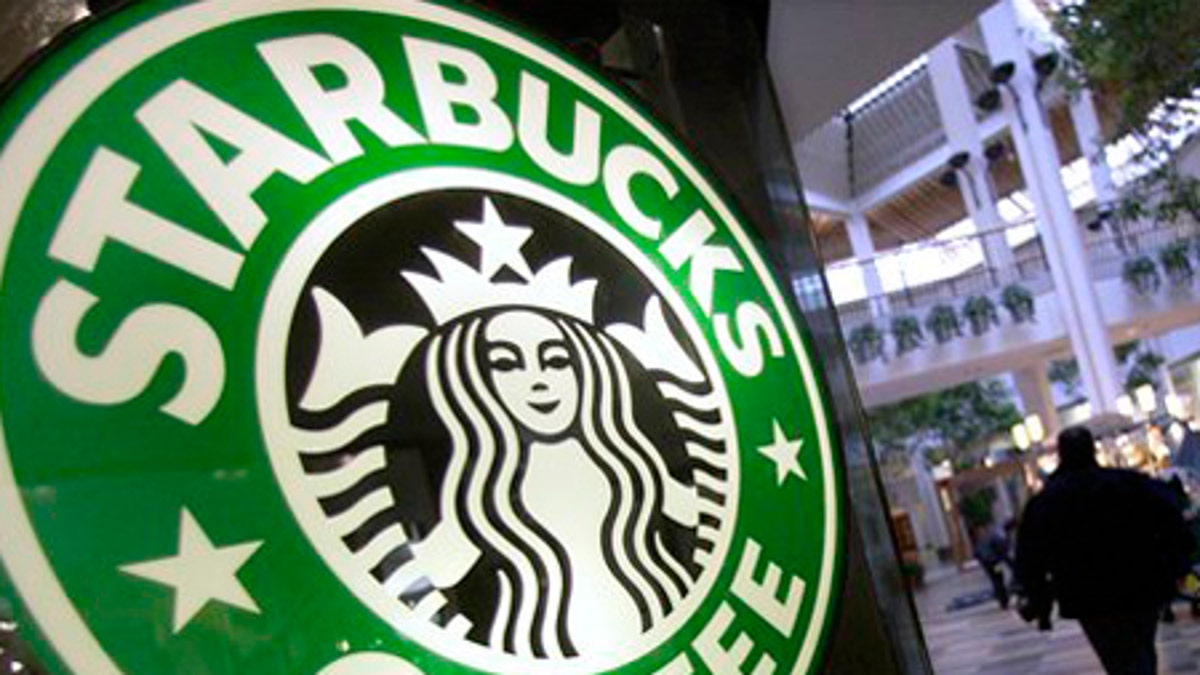
** FILE ** In this Nov. 10, 2008 file photo, a man pulls a cart past a Starbucks store inside the Beachwood Mall in Beachwood, Ohio. The allure of the value meal has long seduced penny-pinchers craving a cheeseburger. Now, as the dismal economy slurps up profits, Starbucks Corp. is hoping to find some sales salvation in its own value meal variety. (AP Photo/Amy Sancetta, file) (AP)
NEW YORK – The allure of the value meal has long seduced penny-pinchers craving a cheeseburger. Now, as the dismal economy slurps up profits, Starbucks Corp. is hoping to find some sales salvation in its own value meal variety.
The tug of war for coffee drinkers has gotten hotter in recent months, with McDonald's Corp. offering new, lower-priced specialty coffee drinks and Dunkin' Donuts advertising value-minded deals.
"You've got a lot of options right now for the more price-conscious consumer to save money," said Andrew Hetzel, the founder of coffee consulting group Cafemakers.
Starbucks has yet to offer many details about what Chief Executive Howard Schultz described to investors last week as "several breakfast pairings" at "attractive" prices. More details are expected as early as later this week.
But analysts wonder if the plan will be enough to keep value-seeking customers from abandoning the mermaid for the clown.
The McDonald's drinks, which are now in about half of the company's U.S. stores, have already garnered a following among some former Starbucks customers like Maudie West.
The 86-year-old resident of Kansas City, Kan. says she has an iced mocha from McDonald's "as often as I can get someone to drive through."
"I just absolutely love them," she said. "They're much richer-tasting than Starbucks."
Starbucks is looking to rebound from dismal sales in the U.S. as more consumers cut back on spending in the deepening recession. In its fiscal first quarter report last week, same-store sales -- a key indicator of a retailer's performance -- dropped 10 percent. That's worse than the 8 percent decline in the fiscal fourth quarter.
Even in areas like the Northeast where business has remained fairly strong, some former Starbucks drinkers have been cutting back or abstaining altogether.
Kathryn Lane, a 30-year-old Brooklyn, N.Y. resident, said she used to indulge in a Starbucks latte as a treat about once a week.
"I go about once a month now at most," Lane said.
Lane has not tried the McDonald's drinks since they have yet to come to the New York City market. But she said she would give it a try: "If it was tasty, I would go back."
Restaurants have been increasingly trying to break into the specialty coffee market, which has grown substantially since 1995, when only 2.7 percent of adults drank a specialty coffee drink every day, according to the Specialty Coffee Association of America. In 2008, that percentage stood at 17 percent.
Starbucks won't say whether competition from its lower-priced rivals has contributed to its sales decline. But analysts say the economy may be driving more value-minded consumers to switch brands rather than just cut back.
"It's hard when people automatically see Starbucks as being more expensive," said Stifel Nicolaus analyst Steve West.
McDonald's is halfway through its nationwide launch of its new espresso-based drinks and said sales are hitting or exceeding internal targets. It declined to elaborate but cited the popularity of the drinks as one factor in its better than expected fourth-quarter results.
McDonald's now offers the drinks in about 7,000 of its nearly 14,000 U.S. locations. Although it is still rolling out the beverages, it is already heavily promoting them locally through coupons and samples.
The McCafe drinks are about 65 cents, or about 25 percent, cheaper on average than those at Starbucks. When shots of flavors are added, the savings increase because a flavor shot costs 35 cents each on average at Starbucks. The shots are free at McDonald's.
West, the analyst, who is not related to Maudie West, says he thinks the McCafe drinks will do well. Given Starbucks' sales declines, he says, "I've got to imagine some of those people are going to McDonald's."
And while McDonald's is well-known for its value meals, those include only the regular drip coffee, not the new espresso-based drinks, at least not yet.
Not to be outdone, Dunkin' Donuts is trying to attract value-conscious consumers with specially priced coffee and food combinations, such as a medium drip coffee and an egg white flatbread sandwich for $1.99. The company, which is privately held, doesn't report financial results and declined to give specific figures.
Much of Dunkin's market base is price-sensitive customers, whereas Starbucks' customer base still includes a die-hard core that may be unwilling to trade down on their coffee.
Melanie Helfrich, a 29-year-old from Louisville, Ky., who favors Starbucks lattes was unimpressed by a free sample of a hot mocha latte at her local McDonald's recently.
"I am willing to pay the extra $2 and wait for my drink in order to get a good cup of coffee," she said.
